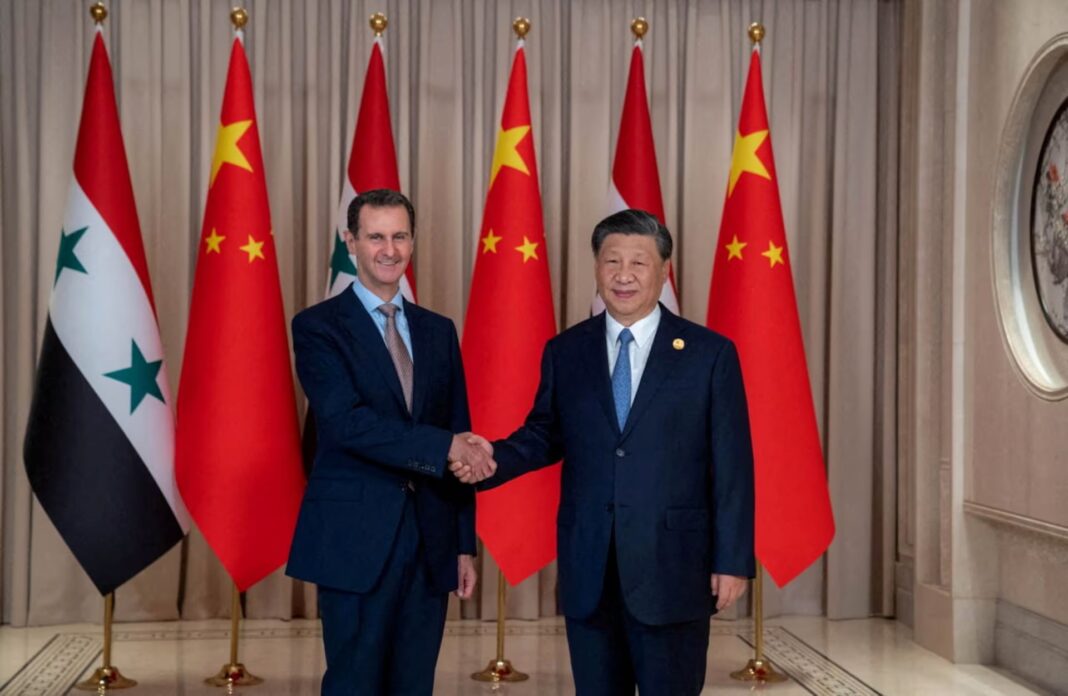China’s diplomatic ambitions in the Middle East took a major hit with the sudden overthrow of Syrian President Bashar al-Assad. This unexpected development not only disrupted China’s plans in Syria but also highlighted the limits of its strategy in the region.
China’s Support for Assad
In 2023, China warmly welcomed Bashar al-Assad and his wife during a high-profile visit. It marked Syria’s entry into China’s Belt and Road Initiative (BRI). President Xi Jinping promised to help Assad rebuild Syria and oppose foreign interference. China positioned itself as a key player in stabilising the war-torn nation.
Assad’s regime crumbled quickly after a rebel coalition captured Damascus. His downfall ended over five decades of rule by his family. This was a blow to China’s image as a stabilising force in the region.
China has aimed to expand its influence in the Middle East by presenting itself as a peacemaker. It brokered a historic agreement between Saudi Arabia and Iran in 2023, improving ties between two long-time rivals. Beijing also mediated talks among Palestinian factions and advocated for peace in Gaza.
Despite these efforts, the region remains volatile. Conflicts like the ongoing violence in Gaza have undermined China’s efforts to showcase its diplomatic strength. The fall of Assad exposed the limits of Beijing’s ability to shape political outcomes.
Impact on China’s Regional Influence
Assad’s collapse also weakened his main backers, Iran and Russia, reducing their influence in the Arab world. This, in turn, hurt China’s ability to rely on these partners for support in the region. Analysts believe Beijing’s failure to prevent Assad’s downfall reflects its limited capacity to act as a dominant power in the Middle East.
China has been cautious in its response. Its foreign ministry called for stability and left the door open for future engagement with Syria’s new government. However, experts believe China will tread carefully before committing to any major involvement.
Economic Risks and Reconstruction Challenges
Syria’s entry into the Belt and Road Initiative in 2022 raised hopes of Chinese investment in rebuilding the war-torn nation. But international sanctions and Syria’s unstable environment have discouraged significant Chinese investments so far.
China’s financial priorities have also shifted. With less funding available compared to the early days of the BRI, Beijing is focusing on safer investments. This cautious approach limits its ability to replace Western nations as an economic or military partner in the Middle East.
Reconstruction in Syria presents massive challenges. While China could use its expertise in infrastructure development, its commitments are likely to remain limited. Financial risks and the ongoing instability in Syria make large-scale investments unlikely.
What’s Next for China in Syria?
China’s next steps in Syria will depend on how the new government in Damascus evolves. Beijing is likely to wait and assess the situation before formally recognizing the rebel-led administration. Any future engagement will prioritize China’s economic and political interests while minimizing risks.
China may also use its diplomatic channels to rebuild ties with Syria’s new leadership. Offering limited financial support for reconstruction could help maintain its presence in the country. However, Beijing is unlikely to take on a leading role in Syria’s recovery.
A Reality Check for China’s Middle East Strategy
The fall of Assad serves as a reality check for China’s ambitions in the Middle East. While Beijing has made strides in diplomacy, its influence remains limited in a region traditionally dominated by Western powers.
China’s cautious approach and focus on reducing risks highlight the challenges it faces in expanding its role. The events in Syria underscore the need for Beijing to reassess its strategy in the Middle East. For now, China must navigate a complex and unstable region while protecting its interests. In the coming years, China’s success in the Middle East will depend on its ability to adapt to changing dynamics and balance its ambitions with practical limitations.

